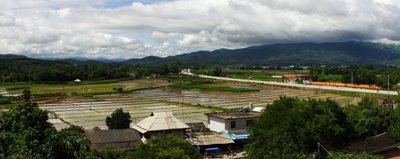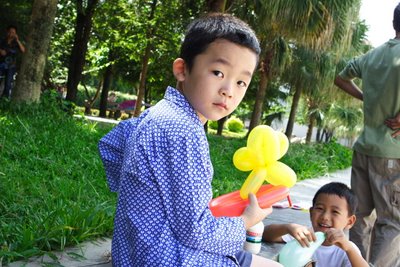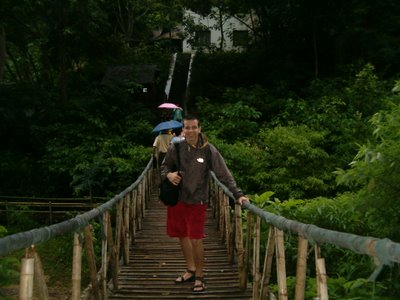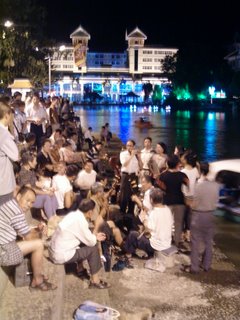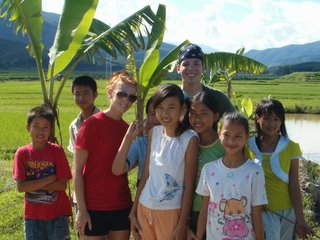
I use the previous post as a preface to this one, which will describe an unconventional but extremely relaxing and productive Sunday in China. We had no structured activities at the school, and we decided to take advantage of the day off to rest and regroup.
Our church service began at 10 a.m. in the office where Tim works. Elayne had asked me to put together a praise and worship set. With Michelle singing backup and Casey accompanying me on another acoustic guitar, I sang four songs, three of which were chosen with China in mind, particularly this region of China:
1. Nothing but the Blood of Jesus-I selected this song not only because I like it, but because I believe that the people here need to realize that salvation comes through no other name but Jesus and by no other means but his blood shed for them. The people here fear spirits, and only Jesus' blood can take that fear away.
2. God of Wonders-This song aptly relates the grandeur of a worldwide God. It helps us, the mission team, keep our minds focused on a God who is "beyond our galaxy" and "holy," which in its truest sense means, "set apart," or "different." God made us in his image, but he is not like us. He is far greater. This song also served as a sort of battle hymn for Steve and I on our trip to JH last year. We sang it as we walked to the bus stop on our first day hiking in the villages.
3. Ancient of Days-On our trip last year, we sang Ancient of Days in a remote village. A guy had come out of his hut playing a guitar with no top string. He lent me the guitar, and we praised God in the middle of a country that suppresses the Gospel.
Tim spoke about God's sovereignty and love, and how the two seemingly contradictory concepts are reconciled. It was a refreshing teaching time on a trip where we had been dishing out a lot of knowledge but taking in very little.
Lunch was even more refreshing. We took taxis to large hotel where were were served our best lunch yet. The banquet room was quiet, and for most of the time our massive group was the only one there. We occupied three circular, family-style dining tables. The place settings had milky white dishes, plastic chopsticks and small glass animals that served as chopstick stands, a far cry from the saucer-and-ricebowl meals we'd been served lately.
Although the hotel had Thai in its name, it served Chinese cuisine from the North, the kind most places in the U.S. serve. Naturally, this was more pleasing to our taste buds. Some of the girls ate more here than I'd seen them eat the entire rest of the week. In between bites, we made cheerful smalltalk and plans for the rest of the day. Some of the girls would go in search of pedicures, and some of the guys (and a few girls) would take a biking trip into the countryside to drink in the region's natural beauty. Others opted to swim at the hotel's pool and then head back to our hotel for an afternoon nap.
With all this talk of leisure, you might think that we forgot this was a mission trip. With only the information I've provided, you're justified in that assumption. But before you assume anything, I challenge you to start considering missions not as an event, but as a process, and one that in closed countries becomes painstakingly slow. Jesus often used farming analogies to talk about the kingdom. In order to grow a crop, you first have to plow the ground, shoveling any rocks out of the way to make room for the seed. Then you have to plant, water and tend the seed. Only after seasons of preparation and care do you see the harvest. In Corinthians, Paul shows that he's familiar with the concept: "Paul plants, Apollos waters, but God brings the harvest."
I say this not to make any excuse for laziness on the mission field; I don't endorse that at all. But I do want to emphasize that there are essential aspects of missions that don't involve standing in a pulpit or sharing the Bible with someone. And you don't have to avoid fun to get work done.
Our bike team was a perfect example of this. What started out as a leisurely ride evolved into a full-fledged prayer-walking (-riding?) expedition, on which we visited villages Brad and Bill had prayed in last year.
I can't tell you how much it meant to be back in this area, continuing the work we had begun a year ago. Even though I hadn't been to this exact spot, the villages on this side of the city were very similar to those where I had dropped VCDs and prayed before. And they house members of the same people group we'd been targeting, the same ornate Buddhist temples and decorative wells dedicated to gods that supposedly provide them with the rain that fills the puddles in their rice paddies, which in turn fill their stomachs with food. Exactly what God had in mind, I don't know, but I'm glad that God chose to use at this time, in this part of his grand redemptive plan for this people.
Three hours and 10-15 miles later we arrived back at the hotel, ready for warm showers and hot dinner. After dinner, Katy and I went to a massage parlor for a miniature date to complete the relaxing evening.
Our church service began at 10 a.m. in the office where Tim works. Elayne had asked me to put together a praise and worship set. With Michelle singing backup and Casey accompanying me on another acoustic guitar, I sang four songs, three of which were chosen with China in mind, particularly this region of China:
1. Nothing but the Blood of Jesus-I selected this song not only because I like it, but because I believe that the people here need to realize that salvation comes through no other name but Jesus and by no other means but his blood shed for them. The people here fear spirits, and only Jesus' blood can take that fear away.
2. God of Wonders-This song aptly relates the grandeur of a worldwide God. It helps us, the mission team, keep our minds focused on a God who is "beyond our galaxy" and "holy," which in its truest sense means, "set apart," or "different." God made us in his image, but he is not like us. He is far greater. This song also served as a sort of battle hymn for Steve and I on our trip to JH last year. We sang it as we walked to the bus stop on our first day hiking in the villages.
3. Ancient of Days-On our trip last year, we sang Ancient of Days in a remote village. A guy had come out of his hut playing a guitar with no top string. He lent me the guitar, and we praised God in the middle of a country that suppresses the Gospel.
Tim spoke about God's sovereignty and love, and how the two seemingly contradictory concepts are reconciled. It was a refreshing teaching time on a trip where we had been dishing out a lot of knowledge but taking in very little.
Lunch was even more refreshing. We took taxis to large hotel where were were served our best lunch yet. The banquet room was quiet, and for most of the time our massive group was the only one there. We occupied three circular, family-style dining tables. The place settings had milky white dishes, plastic chopsticks and small glass animals that served as chopstick stands, a far cry from the saucer-and-ricebowl meals we'd been served lately.
Although the hotel had Thai in its name, it served Chinese cuisine from the North, the kind most places in the U.S. serve. Naturally, this was more pleasing to our taste buds. Some of the girls ate more here than I'd seen them eat the entire rest of the week. In between bites, we made cheerful smalltalk and plans for the rest of the day. Some of the girls would go in search of pedicures, and some of the guys (and a few girls) would take a biking trip into the countryside to drink in the region's natural beauty. Others opted to swim at the hotel's pool and then head back to our hotel for an afternoon nap.
With all this talk of leisure, you might think that we forgot this was a mission trip. With only the information I've provided, you're justified in that assumption. But before you assume anything, I challenge you to start considering missions not as an event, but as a process, and one that in closed countries becomes painstakingly slow. Jesus often used farming analogies to talk about the kingdom. In order to grow a crop, you first have to plow the ground, shoveling any rocks out of the way to make room for the seed. Then you have to plant, water and tend the seed. Only after seasons of preparation and care do you see the harvest. In Corinthians, Paul shows that he's familiar with the concept: "Paul plants, Apollos waters, but God brings the harvest."
I say this not to make any excuse for laziness on the mission field; I don't endorse that at all. But I do want to emphasize that there are essential aspects of missions that don't involve standing in a pulpit or sharing the Bible with someone. And you don't have to avoid fun to get work done.
Our bike team was a perfect example of this. What started out as a leisurely ride evolved into a full-fledged prayer-walking (-riding?) expedition, on which we visited villages Brad and Bill had prayed in last year.
I can't tell you how much it meant to be back in this area, continuing the work we had begun a year ago. Even though I hadn't been to this exact spot, the villages on this side of the city were very similar to those where I had dropped VCDs and prayed before. And they house members of the same people group we'd been targeting, the same ornate Buddhist temples and decorative wells dedicated to gods that supposedly provide them with the rain that fills the puddles in their rice paddies, which in turn fill their stomachs with food. Exactly what God had in mind, I don't know, but I'm glad that God chose to use at this time, in this part of his grand redemptive plan for this people.
Three hours and 10-15 miles later we arrived back at the hotel, ready for warm showers and hot dinner. After dinner, Katy and I went to a massage parlor for a miniature date to complete the relaxing evening.
